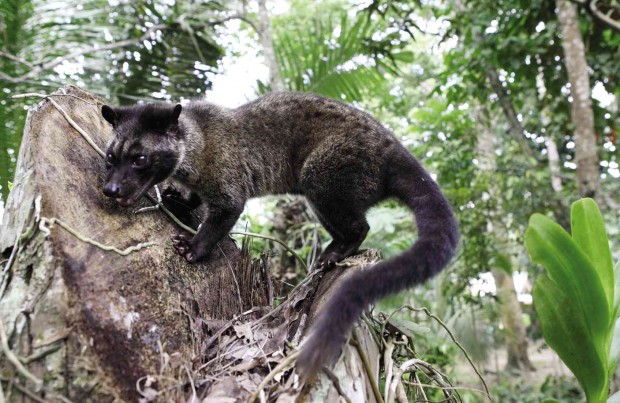PH scientists working to copy civet coffee

COFFEE CAT Filipino scientists are doing research on the civet, which thrives on berries and coffee beans in the forests of South Cotabato province. INQUIRER FILE PHOTO
THEY’RE out to copy the cat.
The taste of the world’s most expensive coffee may soon be replicated by Filipino scientists.
The Department of Science and Technology (DOST) is embarking on a research that aims to find out just how the civet produces the well-loved and in-demand coffee beans.
Science Secretary Mario Montejo told the Inquirer he had already instructed Director Mario Capanzana of the Food and Nutrition Research Institute (FNRI) to form a group of researchers that would look into the civet’s digestive system and the biological processes it undergoes to make the coffee beans it excretes flavorful.
Montejo got the idea of studying the civet’s digestive processes during his visit last week to South Cotabato province as part of his department’s Science Nation Tour.
“As far as we know, the study is a pioneering effort in the world,” he said.
World’s most expensive
The civet lives in tropical forests and thrives on berries and coffee beans. The coffee beans that are excreted by the civet are collected by farmers and processed to become the world’s most expensive coffee.
In the Philippines, South Cotabato is gaining ground in the coffee industry because its Mt. Matutum is home to a number of coffee plantations with civets.
Currently, Montejo said, regular coffee beans retail for P600 per 100 kilograms. For the same quantity, the civet coffee sells for P8,000.
He said that by conducting the research and eventually applying it to the industry, coffee farmers will benefit the most because they would be able to sell their beans for at least P2,000.
To be protected
Montejo pointed out, however, that the result of the study would at most come up with an “approximate” of the civet’s digestive process.
“We can’t duplicate nature, but it will add a premium value to our coffee,” he said.
He also said that with the study, the civet population would be protected since keeping them in an “almost untouched state” was important in replicating their biological process.
Montejo said that they were still drawing up the timeline when the study could be completed and eventually applied to the industry through the FNRI.
The FNRI, an attached agency of the DOST, is mandated to provide knowledge and technologies in food and nutrition, as well as science and technology services, to stakeholders.